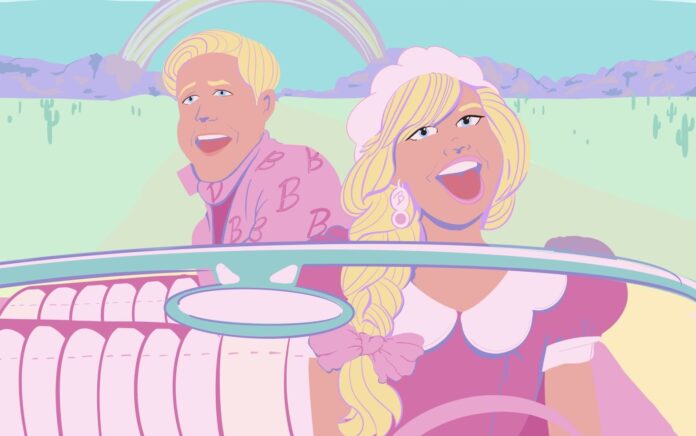By The Editorial Board
This summer, good movies were hitting theaters left and right, but nothing compares to the social phenomenon that is “Barbie.” While shedding light on gender dynamics with an engaging plot, watching and thinking critically about “Barbie” is vital for personal and societal reflection.
Breaking $500 million at U.S. box offices and $1.1 billion globally, it surpassed many other cinematic masterpieces. “Barbie” combined nostalgia and relevant societal norms with a symbol many people treasure from their childhood.
An initial watch of the trailer or advertisements paints the movie as more surface-level entertainment than it actually is. It’s funny and a bit cheesy. However, thinking in depth about what the movie illustrated is important to understand its obvious criticism of the patriarchy and ideas of the female and male experiences.
That being said, the messages and portrayals in the film should not be analyzed as anti-men or excluding the male experience in any way. The contrasts between the Kens and the Barbies intentionally show the struggles both men and women face. Though gender inequalities have been getting better, many still exist today.
The idea of people getting offended by this film or turning a blind eye to the commentary might seem surprising since “Barbie” was very popular, with almost 90% on Rotten Tomatoes. Despite this, many high-profile figures and some media outlets shared their distaste for the themes.
Political commentator Ben Shapiro, who has about 6 million subscribers on YouTube, shared his thoughts in a video on his channel titled “Ben Shapiro DESTROYS The Barbie Movie For 43 Minutes.” Sen. Ted Cruz said in an interview with The Daily Signal that “it’s blatantly false, and it’s Chinese propaganda,” referencing a cartoon map in the film that includes the South China Sea. These are very obvious examples of how some people completely missed the point.
Other criticisms of the movie and its social commentary may be more subtle, but they still refuse to take a step back and reflect on the very real gender roles “Barbie” offers insight to in today’s world. Generally disliking the film is one thing, but refusing to recognize the reality of the social injustices it includes is another.
In an interview with The New York Times, “Barbie” director Greta Gerwig explained a key moment in the film: cast member America Ferrera’s monologue about the tightrope women walk in society.
“Then I looked around, and everyone was crying; even the men were tearing up,” Gerwig told The New York Times. “I suddenly thought that this tightrope she’s explaining is something that is present for women in the way that she’s describing it, but it’s also present for everybody.”
“Barbie” is calling us to support the men and women in our lives and to notice existing gender issues. The mythical world in “Barbie” did not run successfully under the leadership of just the Kens or just the Barbies. Instead, it shows how men and women lead successfully alongside each other, not with just one or the other in control.
Whether you liked the film or not, be a girls’ girl (or guy) and practice empathy for others. Build up the women, men and people around you, validate their experiences and learn from the gender-related hardships they may face.






